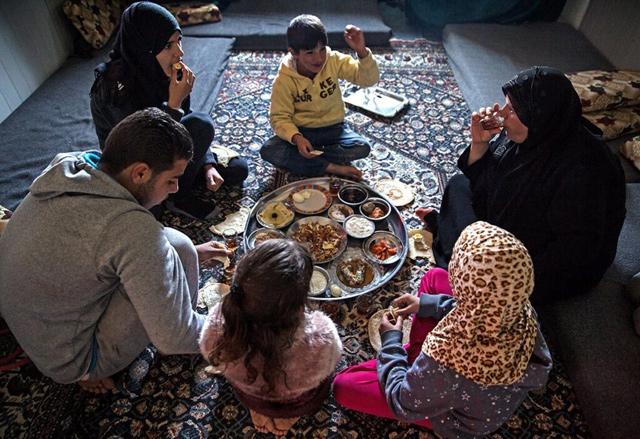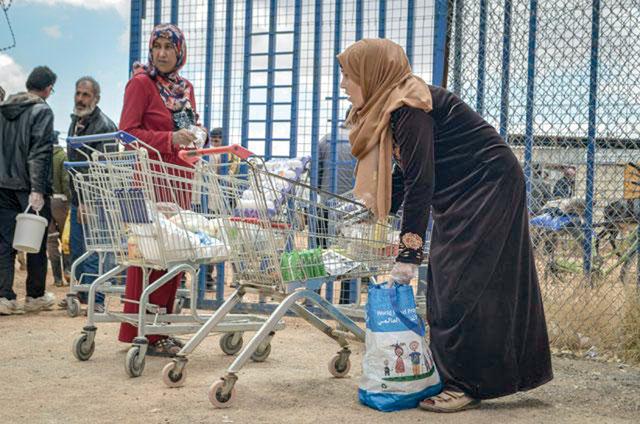You are here
Food assistance cut imminent, WFP alerts 110,000 Syrian refugees
By Hanna Davis - Sep 15,2021 - Last updated at Sep 16,2021

The WFP currently provides monthly food assistance to almost 500,000 refugees in Jordan (Photo courtesy of WFP)
AMMAN — The World Food Programme (WFP) was forced to alert 110,000 Syrian refugees that their WFP assistance will end in October, Alia Khafaga, the communications officer at the WFP regional bureau in Cairo told The Jordan Times on Wednesday.
The end of assistance to the 110,000 refugees, a fifth of the WFP’s target population in Jordan, will come as a result of severe funding shortages, Khafaga said.
The WFP needs around $40 million for the month of October. Unless the WFP receives additional funds from donors, the decision to end assistance to 110,000 refugees will be final, according to Khafaga.
The WFP currently provides monthly food assistance to almost 500,000 refugees in Jordan. This includes Syrians living in camps and the community and around 10,000 refugees from other countries, such as Iraq, Yemen, Sudan and Somalia, according to the WFP website.
Almost 90 per cent of Syrian refugees in Jordan are already food insecure or on the edge of food insecurity, according to statistics sent by Khafaga. These levels of food insecurity have only been exacerbated by the coronavirus pandemic.
A recent WFP survey found that 68 per cent of Syrian refugees in Jordan have seen their incomes drop since the onset of the pandemic and 56 per cent of Syrian refugees in Jordan are unemployed, according to the WFP statistics.
At a time of such economic hardship, the WFP has received more than 37,000 appeals for assistance, representing over 37,000 refugee families in Jordan who need food aid. This is “definitely more appeals than we have seen in the past”, said Khafaga.
These appeals reflect the increasing need among refugees for assistance, which have arrived at a time when the WFP cannot even continue aid to its current families.
The organisation already had to cut assistance for 21,000 vulnerable refugees in July. The cut of assistance to an additional 110,000 refugees would be almost “unprecedented”, Khafaga said.
“I don’t think we have cut this number of people at once. We are very concerned about the impact. We understand that people might resort to coping mechanisms, such as increased school drop-outs, child labour, child marriage, increased debts, or evictions,” said Khafaga.
Many refugees in Jordan depend on the WFP assistance for more than just their basic food needs. The assistance makes up more than 50 per cent of the total household income for 73 per cent families in camps and 44 per cent of families in host communities, according to the WFP statistics.
“Our assistance is a cash-based transfer. Our intention is for people to secure their basic food needs, but some people do use this money to pay for rent or for their medical needs,” said Khafaga.
The WFP funding shortages come as donor countries struggle to support their home economies amid the socioeconomic impact of COVID-19, said Khafaga.
Khafaga added that the lack of funding also comes with the rise of other global crises.
“There are competing requirements from other crises around the world. What just happened in Afghanistan, is attracting attention from donor countries.”
The Syrian crisis has now been ongoing for over 10 years, Khafaga said, also pointing out the “donor exhaustion” currently affecting WFP Jordan’s funding levels.
However, if 110,000 refugees in the Kingdom lose a vital income source, there will be “very harsh implications on society”, Khafaga said.
Related Articles
AMMAN — The United Nations World Food Programme (WFP) in Jordan on Monday welcomed a timely contribution from the government of Canada that
AMMAN — Chinese Ambassador to Jordan Pan Weifang and Representative of the World Food Programme (WFP) Magee Yahia on Wednesday celebrated th
AMMAN — The United Nations World Food Programme (WFP) in Jordan marked the completion of a three-month food assistance programme for Syrian















